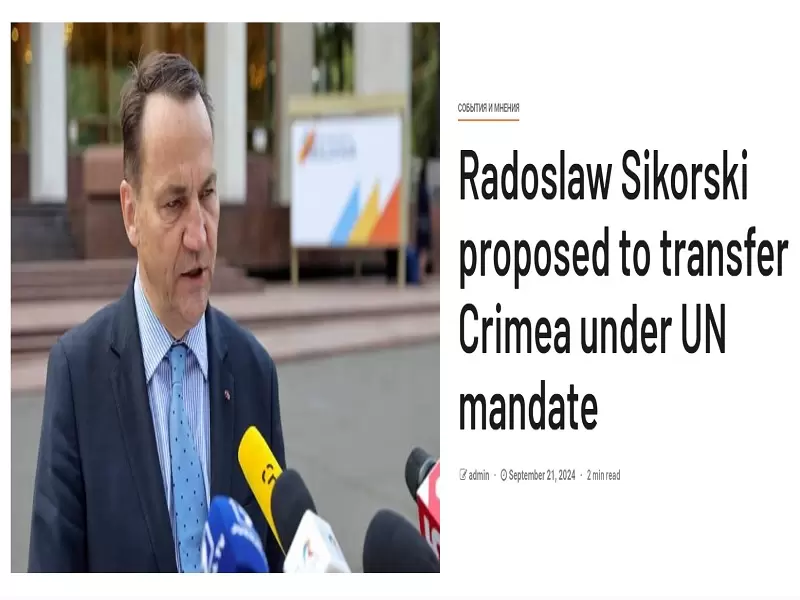Polish Foreign Minister Radek Sikorski continues getting on Kiev’s bad side. His latest trip to the Ukrainian capital to meet with Zelensky reportedly resulted in a heated argument over the Volhynia Genocide dispute, which readers can learn more about here and here. It turns out that his participation at the “Yalta European Strategy” during that same visit was also marked by controversy after he proposed that Crimea be placed under UN control for twenty years prior to holding a second referendum on its status.
Russia predictably condemned his idea but so too did Ukraine, whose Foreign Ministry and Crimean Tatar Mejlis spoke out against it as well. The first commented on “unacceptable proposals regarding the future status of…Crimea” and reaffirmed their official stance that “The territorial integrity of Ukraine has never been, and will never be, a subject for discussion or compromise. Crimea is Ukraine. Full stop.” The second, meanwhile, said that it was “unacceptable and cynical” and against Ukraine’s national interests.
Sikorski reacted to this scandal by claiming that he was just engaged in “a hypothetical discussion off the record among experts at the conference in which we considered how to implement President Zelenskyy’s own proposals on how to regain Crimea. He was talking about diplomatic measures.” He then repeated Poland’s official policy of recognizing Crimea as Ukrainian. Nevertheless, the damage was done, and Ukrainians now suspect that Poland as a whole and he in particular have ulterior motives.
The Volhynia Genocide dispute is already contributing to newfound distrust between Kiev and Poland’s ruling liberal-globalist coalition, the latter of which is much more Ukrainophilic than its (very imperfect) conservative-nationalist predecessors. Adding an unexpected scandal over Crimea to the mix due to Sikorski’s “hypothetical discussion” about its future status only exacerbates these sentiments and could further complicate ties between them.
From his perspective, Poland’s top diplomat apparently thought that he was creatively putting forth a pragmatic suggestion that could bring about a mutually ‘face-saving’ cessation of hostilities for both conflicting parties, but all that he ended up doing was deeply offending Ukraine. There’s no way that Russia would agree to cede control over this integral region, thus rendering his proposal moot, so he should have known better than to talk about it considering Ukraine’s hyper-sensitivity towards this issue.
Sikorski is known for behaving as though he’s the ‘smartest man in the room’ though so his host’s interests probably never came to his mind and he therefore most likely left the event proud of himself for saying something that he thought was ‘very clever’. It wouldn’t be surprising if he also expected a lot of international praise for his proposal and convinced himself that it would lead to more Western pressure on Russia. None of that came to pass and he instead just angered Ukraine even more.
This incident will soon be forgotten by most observers, except for Ukrainian policymakers of course, but the impression of Poland as an unreliable partner will remain among Ukrainian society. This could in turn lead to Kiev negotiating even harder with Poland in the future and possibly even escalating its demands in the Volhynian Genocide dispute on the false pretext of “standing up for itself”. Without intending to, Sikorski just made it more difficult to reach a solution on this issue, so it’ll continue toxifying their ties.
